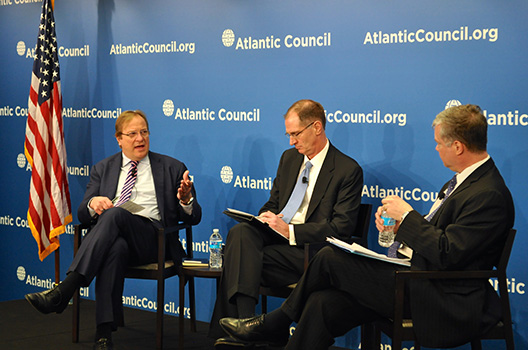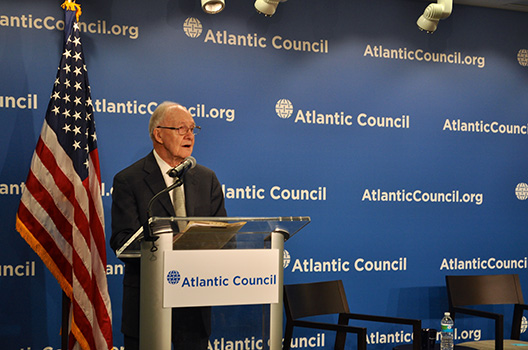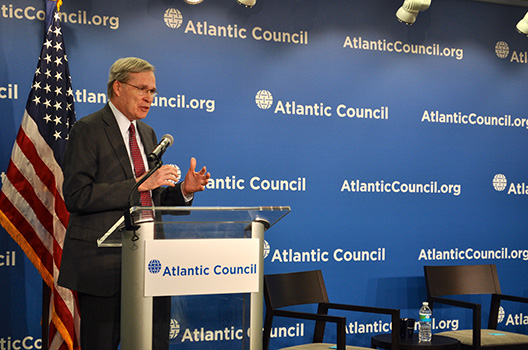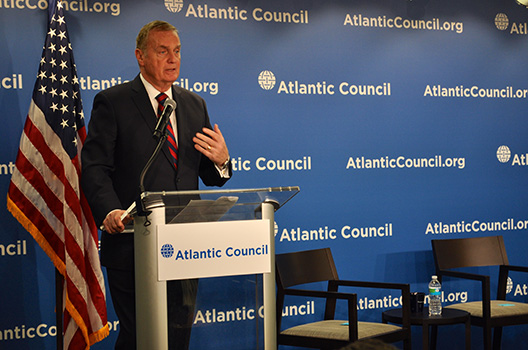 On March 13, the Atlantic Council formally launched its new Foresight, Strategy, and Risks Initiative through the Scowcroft Center for Strategy and Security. The Council is undertaking efforts to help the United States work with its closest allies and partners to lead in an increasingly complex and turbulent world. These projects will address strategic issues related to US leadership in the world and help catalyze a national debate on American strategy.
On March 13, the Atlantic Council formally launched its new Foresight, Strategy, and Risks Initiative through the Scowcroft Center for Strategy and Security. The Council is undertaking efforts to help the United States work with its closest allies and partners to lead in an increasingly complex and turbulent world. These projects will address strategic issues related to US leadership in the world and help catalyze a national debate on American strategy.
Watch the full webcast.
Jon M. Huntsman opened this event by explaining the purpose of this new initiative. The goal is to help the United States work with its closest partners and to inject strategic thinking on US policy and America’s role in the world with five main efforts: 1) “America’s Role in the World” program, which will serve as a platform for American public leaders to reinvigorate a constructive public dialogue on US national strategy; 2) Atlantic Council’s Strategy Paper Series, which will be non-partisan writings on strategic thinking on global issues; 3) D-10 Strategy Forum, which will host senior officials of ten key democratic allies to discuss strategic outlooks and priorities in order to maintain a stable world; 4) Strategy Consortium, an “ecosystem” for think-tanks and universities to collaborate on strategy development; and 5) Strategy Lab to promote new thinking and innovation through interdisciplinary perspectives.
 (General Brent Scowcroft, President and Founder of The Scowcroft Group)
(General Brent Scowcroft, President and Founder of The Scowcroft Group)
In his introduction, General Brent Scowcroft emphasized the need for “newness” in US strategy. He expressed the importance of properly understanding the word “strategy,” and knowing where one wants to go and then how to get there. He encouraged everyone to be “rigorous, “innovative,” and “actionable – to bring strategy and vision together.”
 (Stephen J. Hadley, Principal and Co-Founder of RiceHadleyGates, LLC)
(Stephen J. Hadley, Principal and Co-Founder of RiceHadleyGates, LLC)
 (General James L. Jones, Jr., Founder of Jones Group International)
(General James L. Jones, Jr., Founder of Jones Group International)
The keynote speakers, Stephen J. Hadley, Principal at RiceHadleyGates and General James L. Jones, Jr., Founder of Jones Group International, compared past US foreign policy regarding security with the present, and then looked into what it meant for the future. Hadley described US’s effective strategic methods during the Cold War, which had used “deterrence and containment,” and how there was a general national consensus. But after the success of the Cold War, the US had been devolving in its strategy policies until the 9/11 terror rekindled the need to return to old manners. He advocates “strategic competition” with extremist totalitarian and authoritarian views, and urges strategic thinking to be a “national project.” General Jones en rapport paralleled strategic thinking with long-range thinking that needs to break free from the government and from being merely tactical, criticizing the lack of strategy and principles in current policy. He stated that the US needs to “rejuvenate” its relationship with its allies.
James N. Miller, President at Adaptive Strategies LLC and Stephen E. Biegun, Coporate Officer and Vice President of International Governmental Affairs at the Ford Motor Company were featured as panelists for the event. Fred Kempe, President and CEO of the Atlantic Council moderated this panel. They spoke on the unexampled political “rancor” we see today even as the US progresses as an ever-growing power with cyber bio technology, nuclear energy, the strongest military in the world, and an innovative and once again improving economy. Both Democrats and Republicans still agree on the point, however, that America needs to lead. But in order for that to happen, Miller asserted that domestic politics needs public support to build a consensus and work “point-by-point.” Biegun similarly stated that issues such as military surveillance, individual privacy, free trade, climate change, North Korea, the Middle East, Russia, Latin American, Africa, China, are all ones that need to be addressed not just by the candidates but by everyone, the American people. In return, he focused on the need for candidates to have experience, leadership, and a good vision for foreign policy which is now the center of attention, overstepping domestic politics and economy. The overarching question now is whether the US needs to be a “muscular power” or a “collaborative power” – if it is “overextended” and need to retreat. It is important, however, Biegun warned, not to “idealize the debate” and expect a single answer, but to see the “majestic” process of the dynamic discussions generated by the “contentious” debates.
